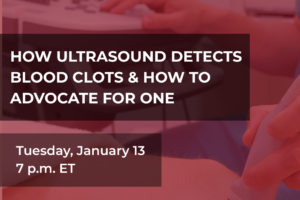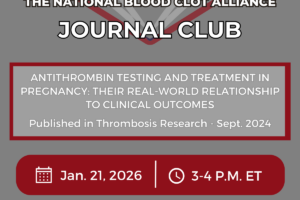 What factors increase my chances of getting a blood clot after knee or hip replacement surgery?
What factors increase my chances of getting a blood clot after knee or hip replacement surgery?
Any major surgery, including hip or knee replacement, increases your risk of a blood clot, because surgery injures blood vessels. Blood vessel injury causes your body to make clotting factors, which are specialized proteins that form clots. Orthopedic surgery distorts your normal bone and muscle structure for a short time, and you may have difficulty moving around right after hip and knee replacement. All increase your risk of a blood clot. Go to https://www.stoptheclot.org/stoplight.htm for tools to assess your clotting risk.
What is important to tell my orthopedic surgeon, so that s/he can better assess my risk for a blood clot?
You should tell your orthopedic surgeon if you ever had a clot, or if anyone in your family has had one, especially your parents or sisters and brothers. If you know you have an inherited condition that increases your risk of clotting, make sure to bring this up. Your orthopedist may refer you to a hematologist, who is an expert in prevention and treatment of blood clots, and will decide how best to treat you, based on your history of clots. The hematologist may order anti-clotting medication (blood thinners) in either injectable or oral form, and advise you and your orthopedist about any additional precautions you may need to take to prevent a blood clot.
What if I don’t have a family history of clots- do I need to ask my doctor whether I need blood thinners when I have my hip or knee replaced?
Yes, you should ask your surgeon about what blood thinner you will need to take after your hip or knee replacement, and find out what you have to do to take it safely. Pill form (warfarin) requires regular blood testing called an INR, and injectable forms usually do not require monitoring. In most cases, your surgeon will recommend treatment with a blood thinner to prevent a clot.
At what point do I start taking blood thinners when I have knee or hip surgery?
More than likely, you will start taking blood thinners the day after your hip or knee replacement.
How long will I be on blood thinners?
You will likely be on “blood thinners” for at least 10-14 days after surgery. If you have a higher risk of a blood clot, your surgeon may recommend continuing the blood thinners for a longer period.
Should I be concerned about taking blood thinners?
These drugs are safe if you take them as your doctor says. Bleeding is the most worrisome effect. Be on the lookout for very obvious bleeding, but also less obvious signs, such as bruising or black colored bowel movements, for example. For safety, it is better to use an electric razor and a soft toothbrush, and make your home safe from falls. Remove any throw rugs, and have bright lighting to see your way when you walk around.
Should I worry more about bleeding than having a blood clot?
Bleeding from blood thinners is always a concern, but careful dosing and monitoring of your INR (if you are on warfarin) by you and your doctor usually avoids major bleeding episodes. The benefit of taking blood thinners to prevent blood clots far outweighs their risk of bleeding.
What else helps prevent blood clots?
The sooner you can get up and move around after surgery, the better. Walking or moving prevents blood clots. Your surgeon may recommend that you wear a “compression device” or compression stockings that are specially fitted and worn from your feet to your knees. They keep your blood flowing to prevent clots. Compression may be used alone, and is helpful as another clot prevention tool if you are on blood thinners.
Once I am moving around at home, do I still have to worry about a blood clot?
Yes. Most blood clots happen after patients go home. The most common time for a blood clot is around 10 days after knee replacement and 21 days after hip replacement. Be on the lookout for any signs and symptoms of a blood clot, which will likely be avoided if you take your blood thinners, wear your compression stockings, and move around as ordered.
What are the signs and symptoms of a blood clot?
Some swelling in the knee or hip area is normal after replacement surgery, but call your doctor right away if you notice a sudden increase in the amount of swelling or pain in your leg, reddish or bluish skin discoloration, or skin that is warm to the touch. These are signs of a blood clot in your leg, known as a deep vein thrombosis (DVT).
If you feel sudden shortness of breath, chest pain that is sharp and stabbing and worsens with each breath, rapid heart rate, or if you have an unexplained cough with or without blood-streaked mucus, you might have a clot in your lungs, known as a pulmonary embolism (PE). If you have any of these symptoms, you must get immediate medical attention because a PE can stop your breathing. See https://www.stoptheclot.org/learn_more/learn_more.htm to learn more about the signs and symptoms of a blood clot.
What should I do if I think I have a blood clot?
You should seek immediate medical attention if you suspect a blood clot in your leg or lungs. If you have signs of a lung clot, the safest action is to call an ambulance, if prompt service is available in your area, because a PE is a medical emergency that requires immediate care.
What key information should I know about blood clots before having knee or hip surgery?
- Make sure you talk to your surgeon about ordering blood thinners to prevent blood clots
- Try to be as active as possible after surgery, but follow your orthopedist’s instructions about what you can and cannot do
- Seek immediate medical attention if you suspect you have a blood clot







